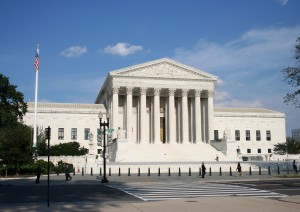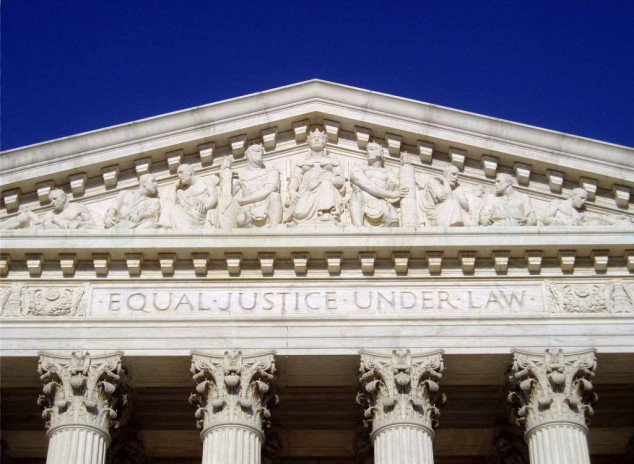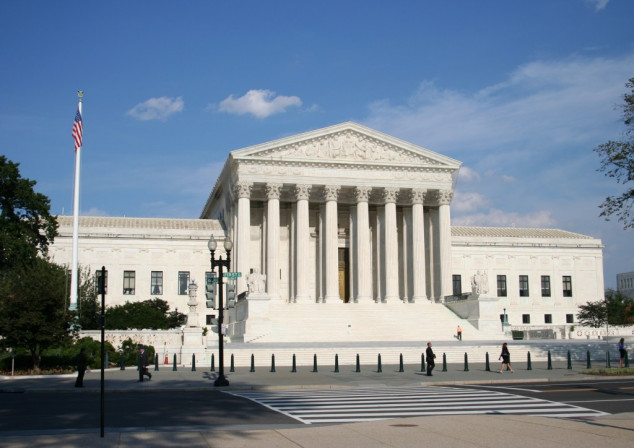Supreme Court Hears Arguments on Healthcare Law

Obama’s Affordable Care Act which sought to bring health care to the nearly 45 million uninsured Americans is being challenged in the Supreme Court. Arguments took place Monday through Wednesday of this week.
Several states and a private interest group (led by Florida) are accusing the federal government, and by extension, the Obama Administration of overstepping their bounds as outlined by the constitution. The main disagreement is over the individual mandate which requires all Americans to carry health insurance or to pay a fine.
Supporters of the law cite the Commerce Clause (Article I, Section 8, Clause 3) of the Constitution which allows the federal government to regulate all interstate commerce. The clause has been fought several times in the court and has led to everything from government programs that try to make waterways more navigable to the desegregation of buses that travel between states during the 1950s. The supporters state that because hospitals are required to provide care to everybody, regardless of ability to pay, that it is a unique market.
Detractors argue that if this bill is allowed through it will “open the flood gates “ to all sorts of new laws that would now be deemed constitutional. They argue that if inaction -in this case to buy health insurance- is deemed to be a form of inter-state commerce congress will be granted almost unchecked power to regulate the everyday occurrences in our lives.
The court seems to be evenly split, with Justice Kennedy being the “swing-vote” who will likely lead to the court’s decision. The arguments have revolved around one unlikely vegetable for much of the case, broccoli.
Justice Scalia stated “Could you define the market? Everybody has to buy food sooner or later, so you define the market as food, therefore, everybody is in the market; therefore, you can make people buy broccoli.”
Not all of the justices were as amused and persuaded by the example. Justice Breyer retorted the example saying “You ask really for limiting principles so we don’t get into a matter that I think has nothing to do with this case: broccoli, okay?”
According to a recent CNN poll, most Americans agree with the detractors. 43% stated that they supported the law (up 5 points since last November) and that 50% disapprove of the law (down 6 points since last November). Notably, about 1 in 10 of the respondents who disapproved of the law stated that the law was not liberal enough, as opposed to the typical objections.
Ohioans seem to share the national opinion, last year, Issue 3 promoted a state constitution change that would include a clause that stated that Ohioans would be free of the insurance mandate. However, if the Supreme Court rules in the Obama Administration’s favor, the Ohio law (along with the similar laws that were passed in several other states) will be overturned.
The Affordable Care Act contains many more provisions past the individual mandate. One of the most important systems is a subsidy that helps people who can’t afford insurance purchase it and avoid the penalty, these subsides continue to help out families until they begin to earn ~$90,000 per household.
The law also extends Medicaid benefits to people who earn $17,000 a year. One provision that may be more relevant to THS is the requirement the insurance providers allow children to stay on their parents health insurance plan all the way until age 26, this aims to help youth in college pay for medical expenses more efficiently. However, some of the justices wonder if any of the provisions will be able to stand if the mandate is overturned
You can expect a ruling on the Affordable Care Act around the middle of June; if you can’t wait that long you can always go to http://www.supremecourt.gov/ to find the transcript and recording of the arguments.






